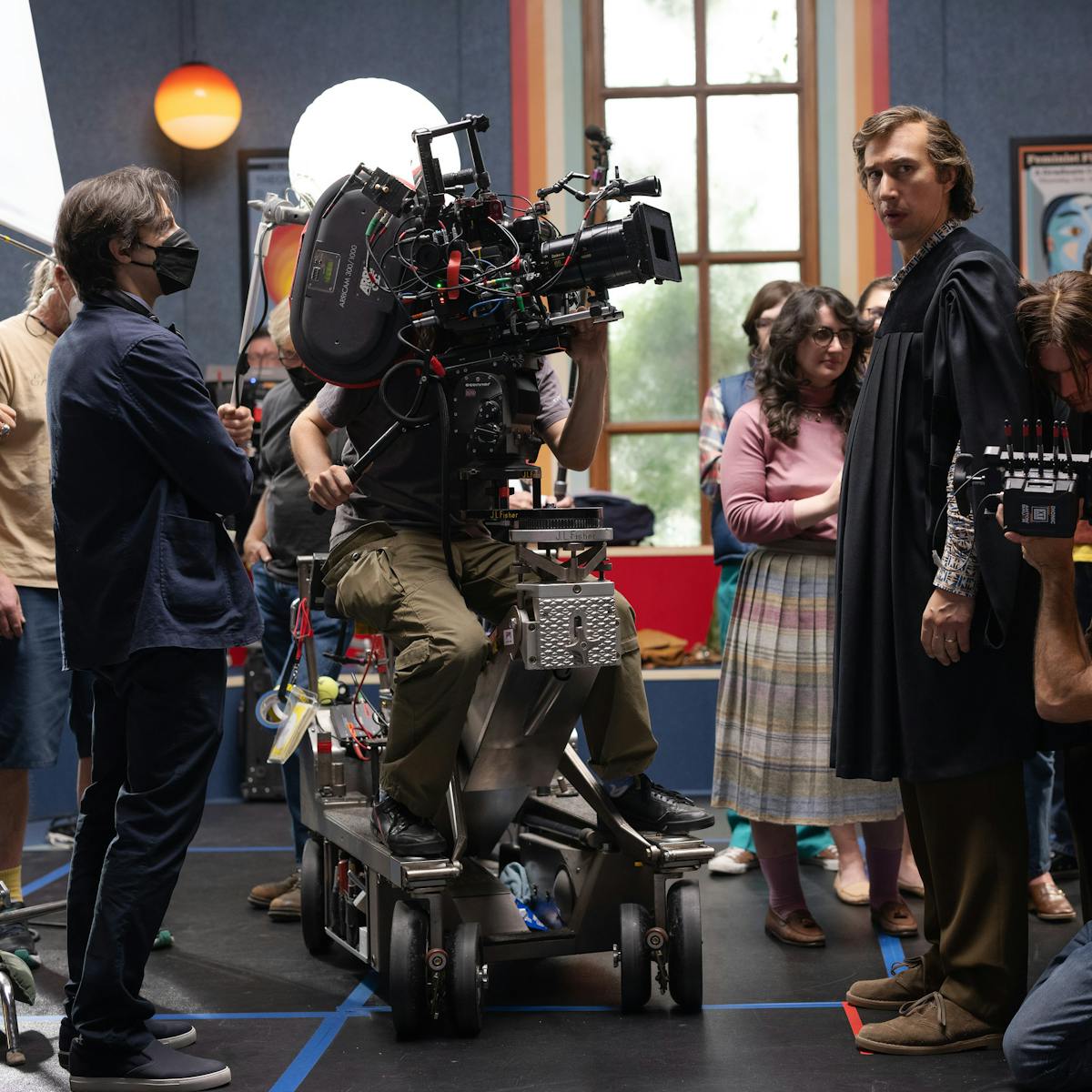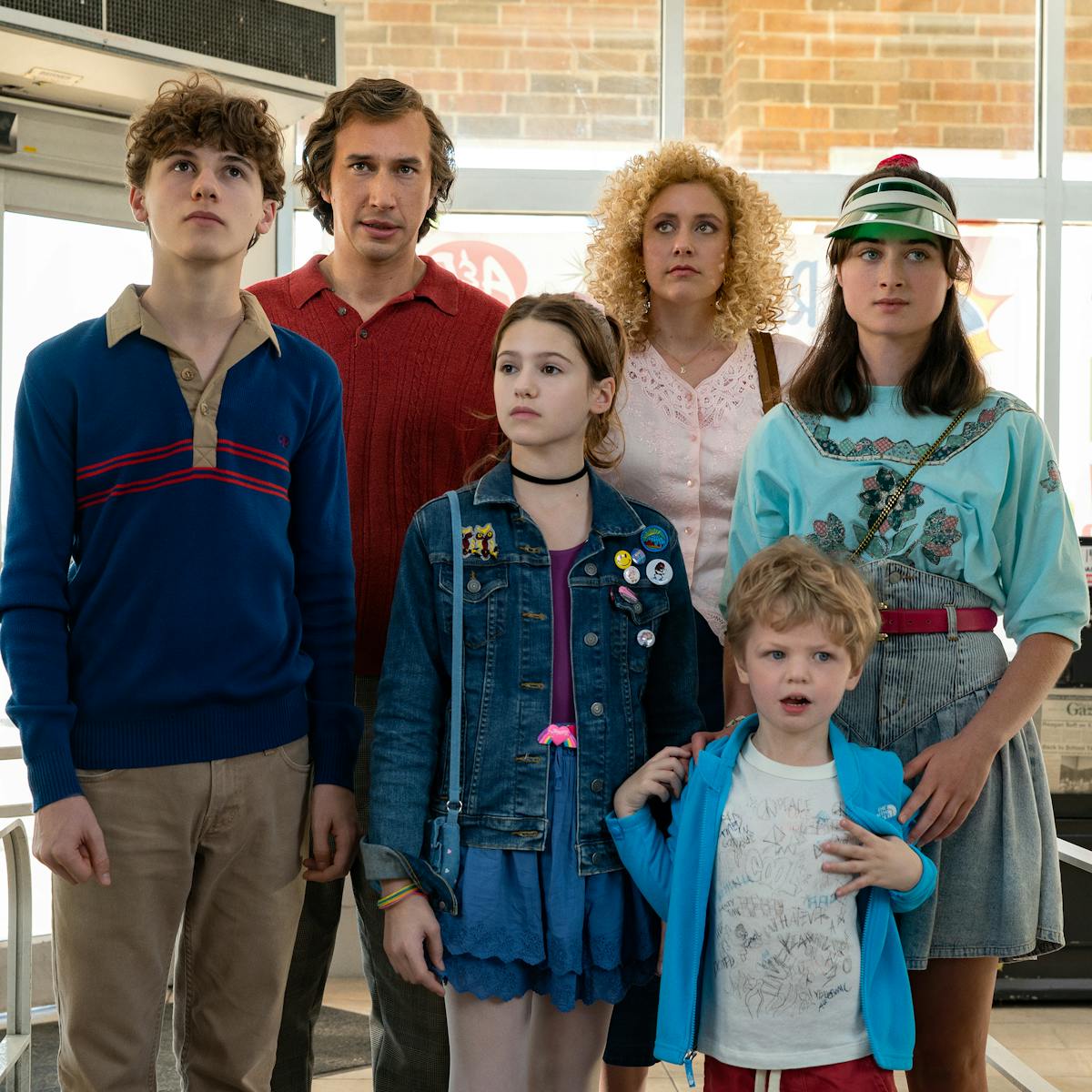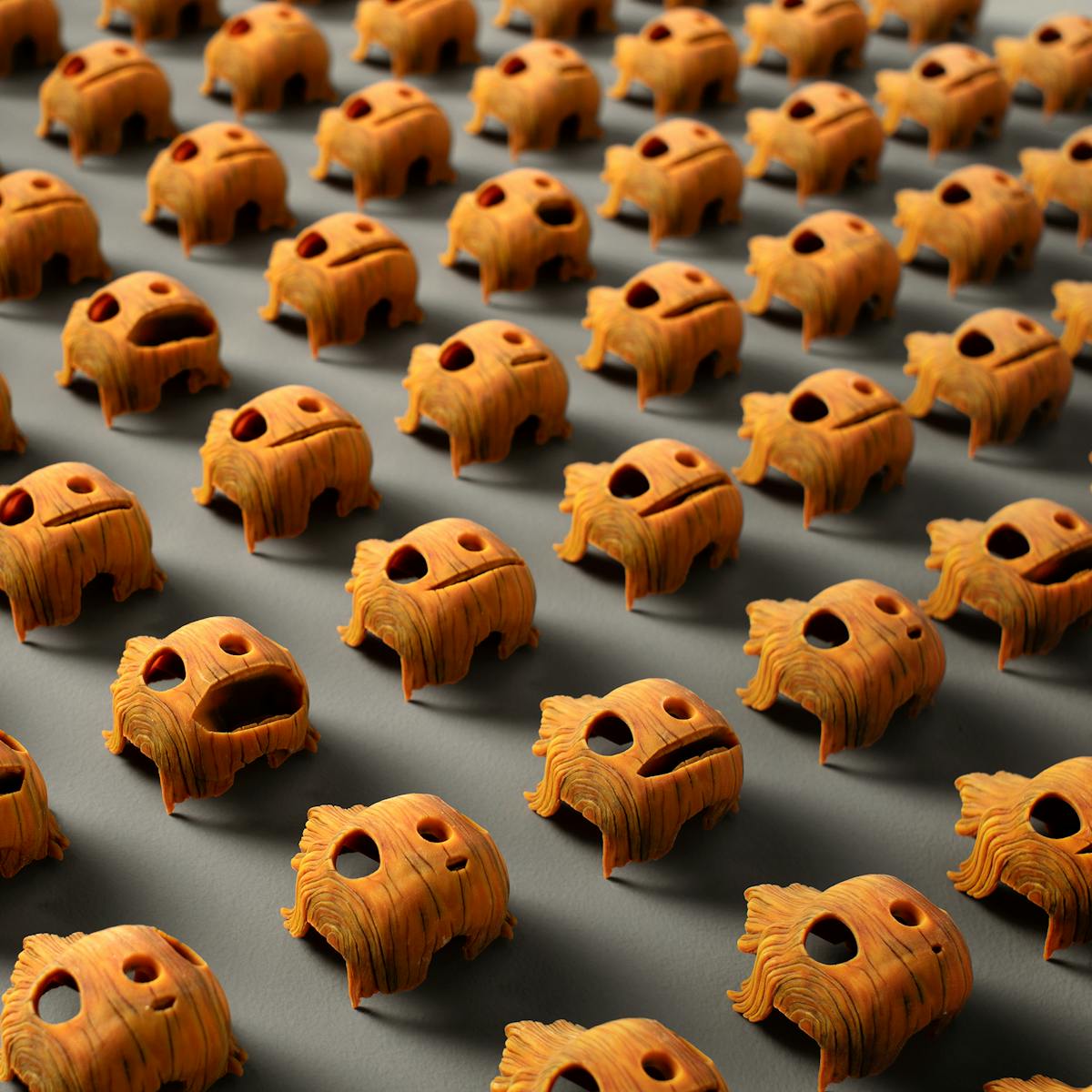Filmmaker friends Noah Baumbach and Wes Anderson discuss Baumbach’s latest film, White Noise.
When Wes Anderson joined Noah Baumbach in the intimate screening room of a London hotel this October for a dialogue about Baumbach’s film, White Noise, what the audience experienced was more akin to a conversation between two longtime friends over lunch. “Wes and I,” said Baumbach, “we go about our lives and then we often reunite at Q&As.” Added Anderson: “About half of the time we spend catching up is in front of a small audience in the basement of the hotel.”
In the time between these Q&A meetups, both directors have been prolific. Baumbach has written and directed more than a dozen films including The Squid and the Whale, Frances Ha, and Marriage Story, and the two friends have even worked together on beloved films Fantastic Mr. Fox and The Life Aquatic with Steve Zissou. As the Oscar-nominated writer-directors chatted, the crowd, including White Noise star Greta Gerwig, heard stories (filled with clarifying asides) about other auteurs and about how Baumbach came to create his latest masterpiece.
White Noise is an adaptation of Don DeLillo’s decidedly 80s novel, which centers on professor Jack Gladney (Adam Driver), wife Babette (Gerwig), and their precocious children, as they confront physical and metaphorical crises. It’s existential, it’s humorous, it’s another pristinely written and crafted film from Baumbach and his team of collaborators. Anderson is a fan, admitting, “I mean, I told you, I loved the movie.” To which Baumbach replied, “Yes, I saved your voice message.”
Join the audience of eavesdroppers as two celebrated writers and friends catch up about White Noise.
An edited version of the conversation follows.
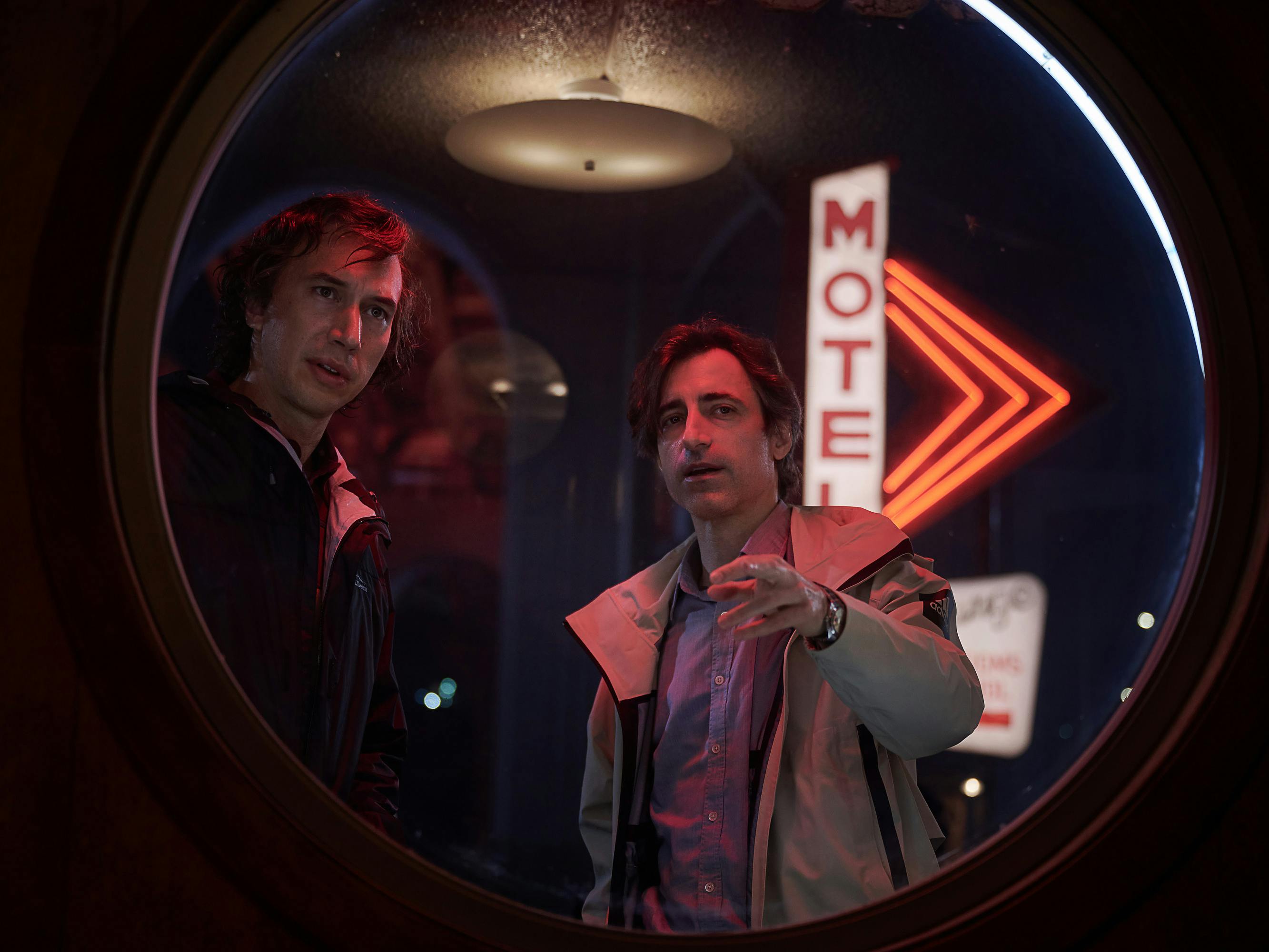
Adam Driver and Noah Baumbach
Wes Anderson: I hope I don’t overstep my position today. I feel I know your body of work well, which, I feel, means I’m qualified to do this.
Noah Baumbach: You’re overqualified.
Anderson: You’re a reader and a writer, and you’ve adapted before a little bit, but I think this is the first time that you have directed a movie [adaptation] of a book.
Baumbach: That is correct.
Anderson: I think that your movies come directly from you, and I don’t really think the directing of the movies is exactly interpreting material, but this is. Or, is it?
Baumbach: Well, I was thinking about our friend Brian De Palma because he would do things that he wrote and things that he would interpret, like Scarface or [The] Untouchables, versus Blow Out or Dressed to Kill, which were very much straight Brian. And this isn’t quite that, because I did adapt it, but a lot of it was the timing. After Marriage Story, I had a feeling that maybe I had run out of ideas. It was the first time I didn’t have a “thing” waiting. You know, we have dinner and we say, “What are you [working on] . . . ”
Anderson: “There’s this thing.”
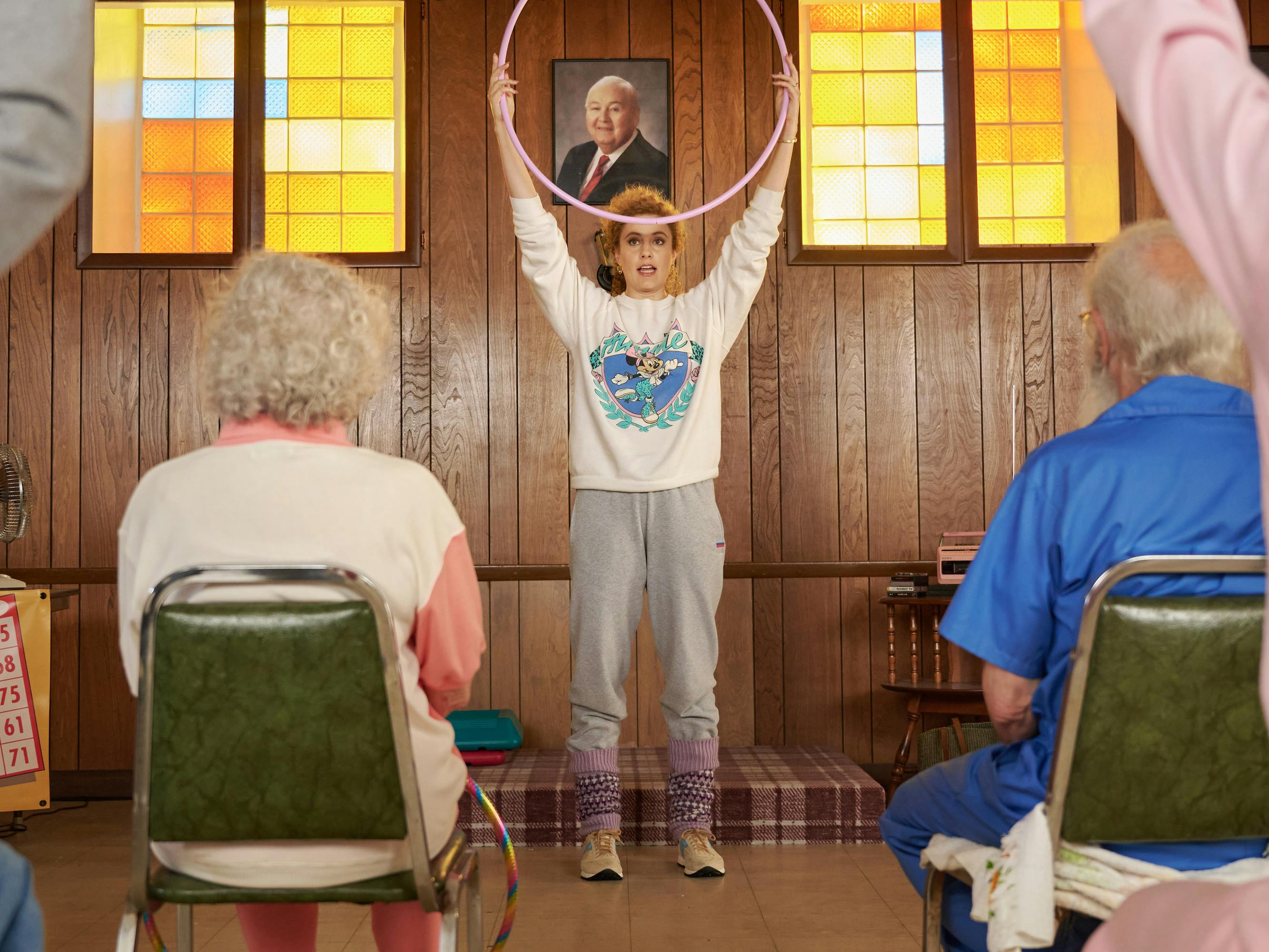
Greta Gerwig
Baumbach: I remember, once, we were sitting in Paris on a bench talking, and you said, “I was in a church and I saw this man and he had this bandage on, and something had happened to him.” That ended up in The Darjeeling Limited, as you know.
Anderson: I forgot that. I based a movie on him.
Baumbach: So we have those “things” that we’re always developing both consciously and unconsciously all the time. And there was a relief in a way that I didn’t know what I wanted to do. Then I reread this novel [White Noise] and it coincided with this pandemic happening, and I thought, I feel all these things and this book is expressing them in some way. Not only the ideas, but the tone and the vibe of the book feel how the world feels to me right now: that feeling when the world isn’t entirely real to you. And I thought, Well, maybe I could try to adapt this and express myself by using this other material.
Anderson: I’m going to lead us in another direction. I remember I did a Q&A with Barbet Schroeder once about [his 1987 film] Barfly at the Cinémathèque in Paris. And I opened with, “One thing I love about Barfly is it’s set in this seedy place, but it has a dreamlike feeling. It has this glowing thing.” In his response he said, “That’s everything I hate in cinema. I don’t like dreamlike at all. That’s what I hate to see in cinema. I wanted to make it totally realistic.” And I said, “I think you succeeded beautifully in everything you hate.”
Baumbach: I once was on a plane with David Cronenberg and I said, “I love how your movies feel sort of in this other place. Like, I recognize the buildings, but I don’t. You put me in this dreamlike place where it’s kind of like reality but not reality.” And he said, “That’s just Toronto. I shoot these on location in Toronto.”
Not only the ideas, but the tone and the vibe of the book feel how the world feels to me right now: that feeling when the world isn’t entirely real to you.
Noah Baumbach
Anderson: Well, this is a big movie and it has giant set pieces; it’s science fiction in a way. It’s the things you described that Cronenberg doesn’t think he does. One thing that struck me about this movie is that it’s sort of Spielberg-size in the family, the toxic event, but so much of it is about the words. It’s a very literary kind of movie. And I think it’s the most unusual combination. Can you speak to that?
Baumbach: The book is obviously very literary, and it uses a language of Americana, the slang and TV advertisements and things from sports announcers; all this overheard language that is then imbibed by the family. I felt like, Well, maybe there’s a movie equivalent of that. I was thinking about the time period and my own reading of the book because it brought me back to my childhood; I was discovering movies at that time. I thought, Well, maybe there’s a kind of American movie language that could be used to express some of these things that were more literary. And we could do that with actual sound and play real TV, and I could mic everybody and do a thing where everybody’s talking all at once and play with that. I thought visually there was also a way to use the language of a lot of these genres and movies and other directors in a way that’s familiar to the audience. It’s like a handle for you while you’re watching something that maybe has no real handle. It’s very unusual. The book has a very unusual, particular quality to it, but it uses very familiar tropes and things to bring you into it. I thought this was a kind of movie way to do it.
Anderson: So here’s another question. Did you rehearse the movie? Did you gather the whole cast together?
Baumbach: I feel like I [used to] gather everybody, and you do it a few times and everyone’s pretty good, and you’re like, I have them for another two weeks, so I’ve got to think of other things to do. Then you come up with something like, We’ll all go to a movie together. We’ll bond. On this one though, I had choreographer David Neumann, who had worked with me on Marriage Story, and we really choreographed it. It’s like blocking, but the movement and the dialogue work in concert. In the beginning of the film, it’s more in control. There are these rituals we have; the morning ritual, the shopping ritual, the work ritual, the bedtime ritual. Then, in the third part, it’s how they start to fracture once we become more aware of what’s beyond, of what these rituals are maybe invented to disguise. Things start to break open, and the camera starts to break free in ways as well. By the end, it’s been freed entirely so that it can become something totally abstract.
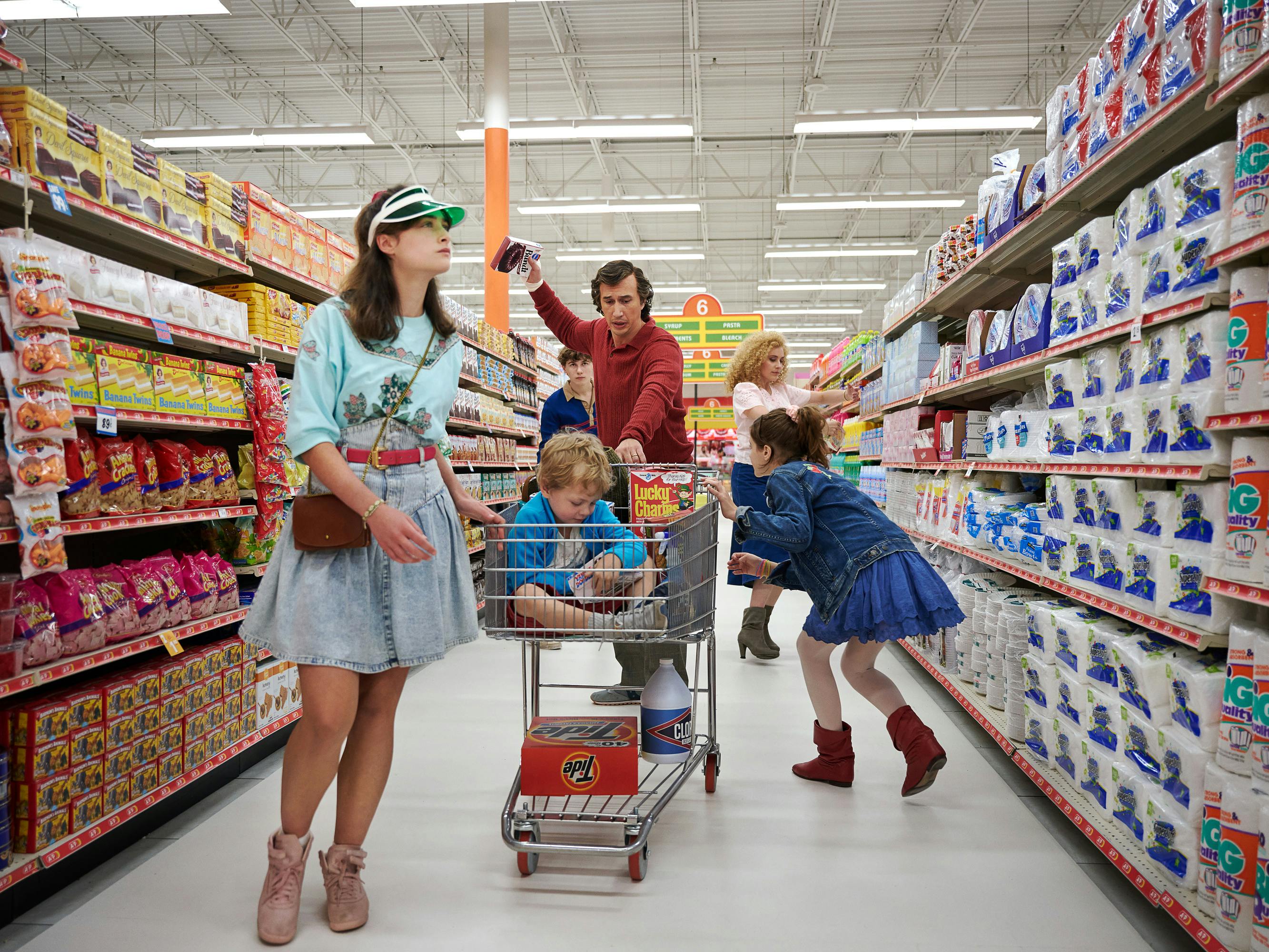
Raffey Cassidy, Henry/Dean Moore, Sam Nivola, Adam Driver, Greta Gerwig, and May Nivola
Anderson: It becomes a complete dance. [Turning attention to actor Greta Gerwig who is sitting in the audience] So what is that like, to be playing a scene where you’re the character and you’re working with a choreographer? If you don’t mind me drawing you into this.
Greta Gerwig: Yes. Well, David Neumann is extremely smart and funny, and we rehearsed for a month. And the requirement was that everybody come to rehearsal being word perfect on the script, including the kids.
Then David Neumann would come in and say, “Well, what if you just did a little spin here?” He’d give you an extra little movement and you’d have to incorporate it in a naturalistic way that was another technically unnatural, but sort of wonderful, piece of movement. And he did that over every scene. He would watch and say, “What if you shut the door with your foot instead of your hand?”
Anderson: Had you ever worked with [production designer] Jess Gonchor and [composer] Danny Elfman? How were those experiences?
Baumbach: It really was exciting working with both of them. Jess made that whole supermarket from an empty Home Depot. It was incredible. And the motel was built. Those bridges are there, but there was no motel. A lot of the interiors are sets because we had so much movement and we needed the space. He’s fantastic. And Danny as well. I thought of Danny immediately because of all the genre-shifting; he could do something that would feel really cohesive, but also embrace all the different movements in it. My fantasy of Danny Elfman was that the death aspect of the movie would appeal to him. And it did, very much. But he also did a lot of electronic music with orchestral music. We were also talking about Aaron Copland and the Americana of it. So it was sort of this Aaron Copland-meets-Tangerine Dream idea that ended up in the movie.
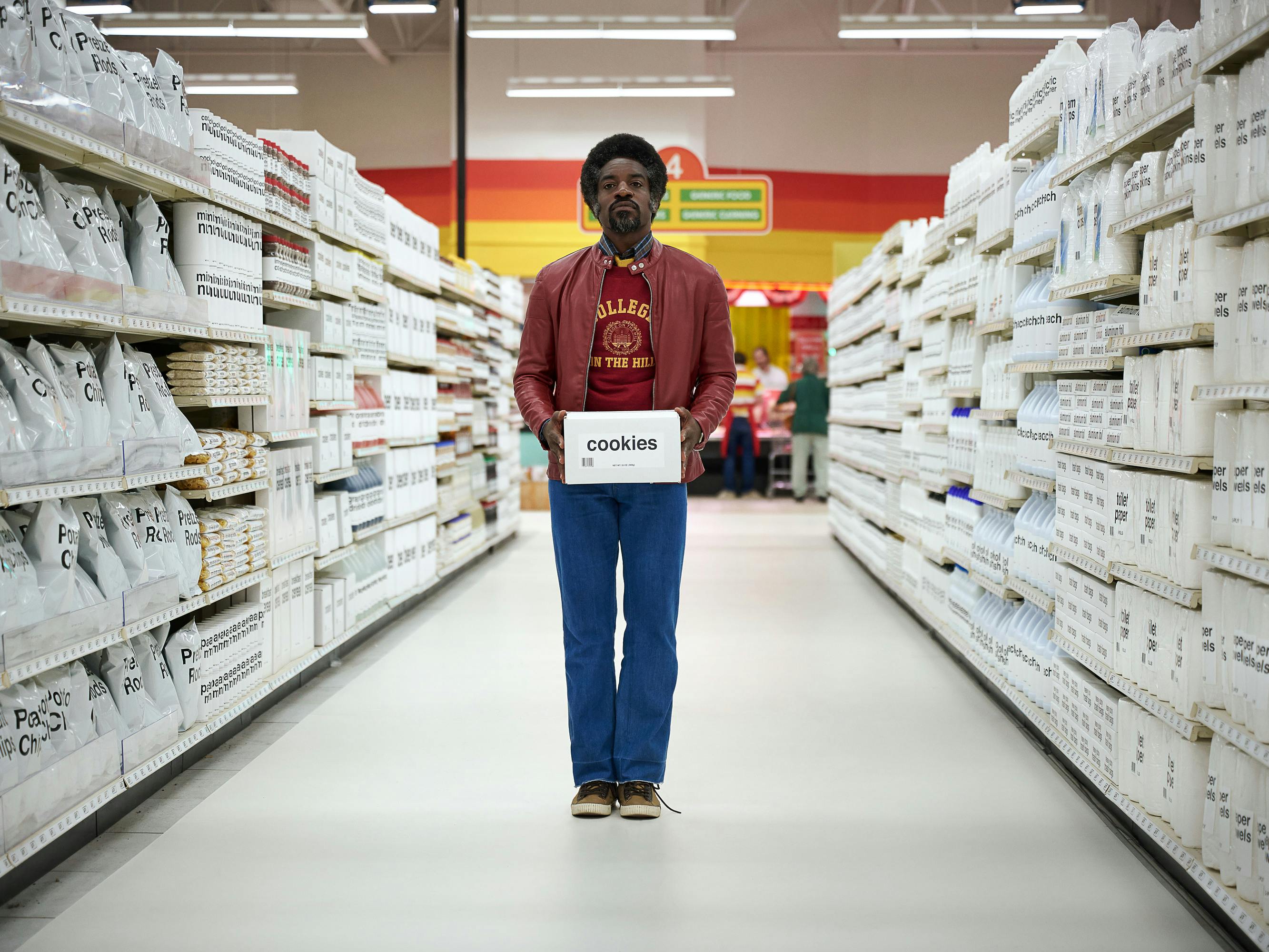
André Benjamin
Anderson: Maybe we can talk about the end of the movie, the dance. James Murphy [of LCD Soundsystem] has written this great song. When did you say, This is where it’s going to go, this is how we’re going to end it?
Baumbach: That’s one of those things about writing original scripts: you get to a thing and you’re like, Oh, maybe this, because that [scene] isn’t in the book. The book ends in the supermarket. The film’s so verbal and there are so many ideas that my first thought was that it seemed like a good idea. Something gets loosened up in the movie and this becomes possible. I felt like, Maybe this is kind of what we all look like anyway from a distance if we could all just observe ourselves on some sort of loop. David Neumann and I looked at a lot of dances of mourning and death from many different cultures, and a lot of them were quite joyous and are very expressive. So it was this combination of shopping and death that was, essentially, a sort of dance of life, which is a dance of death.
Anderson: And shopping.
Baumbach: And I felt like, Well, we’ve all gone through a lot. This might be a nice way to go out.


